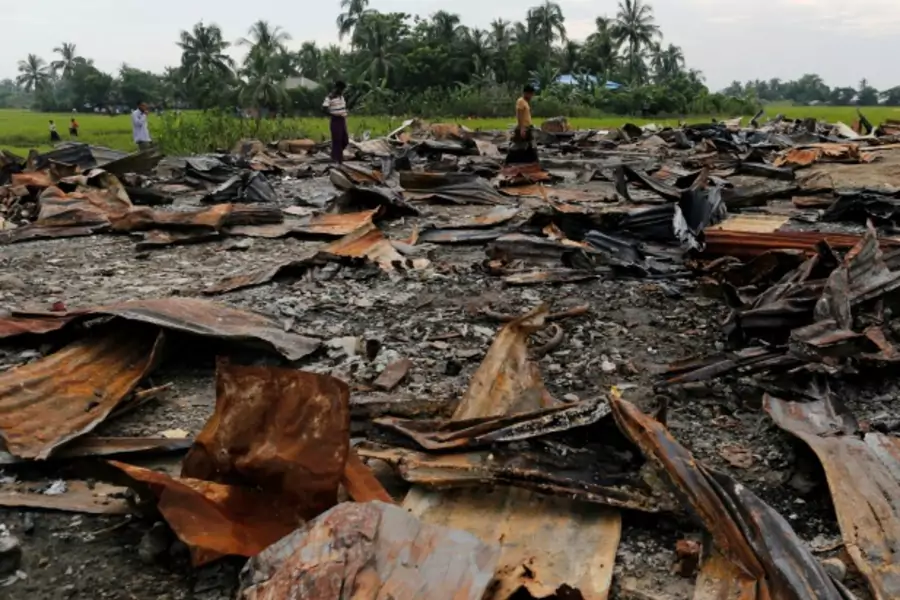Rakhine State, where violence has been escalating for two months after Rohingya militants allegedly attacked a border guard post on October 9, is spiraling into chaos. As I noted in a recent post, the government of Aung San Suu Kyi seems unable, or unwilling to control security forces operating in northern Rakhine State, where they have been numerous reports of reprisal killings, beatings, and house-burnings against Rohingya in the weeks since October 9. The Myanmar government reportedly has made parts of northern Rakhine State off-limits to journalists and aid groups, making it hard to assess the true state of damage there.
The unrest in western Myanmar has been going on for at least five years, since a first round of violence in the early 2010s. As army rule gave way to quasi-civilian rule in Myanmar at that time, violence against Rohingya expanded throughout Rakhine State, driving over 100,000 people out of their homes, and destroying many Rohingya communities. At the time, many Rohingya fled Myanmar or crowded into makeshift camps, but there were few attacks by Rohingya on Buddhist Rakhines or state institutions.
More on:
That may be changing. Now, in a comprehensive report, the International Crisis Group (ICG) lays out a new potential impact of the years-long campaign, by security forces, paramilitaries, and average citizens, against the Rohingya in Rakhine State. According to ICG’s investigators, Rakhine State is witnessing the “emergence of a new Muslim insurgency there. The current violence is qualitatively different from anything in recent decades, seriously threatens the prospects of stability and development in the state and has serious implications for Myanmar as a whole.”
Indeed, ICG is the first to report that a sizable militant network has emerged among Rohingya. It argues, based on extensive interviews, that:
The insurgent group, which refers to itself as Harakah al-Yaqin (Faith Movement, HaY), is led by a committee of Rohingya émigrés in Saudi Arabia and is commanded on the ground by Rohingya with international training and experience in modern guerrilla war tactics. It benefits from the legitimacy provided by local and international fatwas (religious judicial opinions) in support of its cause and enjoys considerable sympathy and backing from Muslims in northern Rakhine State, including several hundred locally trained recruits.
Some other Myanmar-based reporters and civil society groups have questioned the ICG report, wondering whether the reported militant network is really that well trained and equipped, given that the Myanmar security forces mostly seem to be arresting alleged militants with knives, or ancient guns, Still, the possibility that Rohingya angered by the state’s growing political, social, and economic marginalization of them, would eventually turn to violence, could never be ruled out. Even before ICG’s report outlined the rise of new militant Muslim networks in Rakhine State, some Myanmar security experts had warned that scorched earth government tactics, and the disenfranchisement of most Rohingya before last year’s elections, would eventually fuel a counteraction. ICG notes:
Disenfranchisement prior to the 2015 [national and state] elections severed the last link with politics and means of influence. At the same time, the disruption of maritime migration routes to Malaysia closed a vital escape valve, particularly for young men whose only tangible hope for the future was dashed. An increasing sense of despair has driven more people to consider a violent response.
Indeed, even before this report there have been rumors floating around for years among diplomats and security experts in Myanmar that the Islamic State, militant groups based in Persian Gulf states, and older, seemingly defunct Rohingya militant groups that operated in the 1990s and 2000s, were trying to recruit young men in Rakhine State. Militant groups were allegedly targeting those alienated by the violence of the early 2010s, and trying to convince them to launch attacks against Rakhine Buddhists and representatives of the state. Until early October, these rumors seemed just that.
The question now is, how widespread has militancy become among Rohingya---and how much support militant sentiment might have? How real and how large is this supposed insurgency? ICG has identified a potentially new and dangerous militant network, but it is unclear how much it draws on the actual views of the Rohingya population. Second, and most important, how can the Myanmar security forces---notorious for abusing civilians and allegedly complicit in the attacks on Rohingya going back to the early 2010s---effectively prosecute a campaign to shut down militant networks without turning to even more brutal tactics against the entire Rohingya population?
More on:
As ICG notes, de facto head of government Aung San Suu Kyi has little actual control over the military, or little desire to exert control. Since early October the armed forces operating in Rakhine State appear to be operating without any civilian leadership from Naypyidaw. To eradicate militant networks, security forces in Rakhine State will have to increase intelligence gathering, work with regional governments to understand growing radicalism in Rakhine State---but also stop the wanton beating, torture, and killing of civilians in Rakhine State that has, too often, been the norm for security forces. The army’s usual scorched earth tactics have been the major source of the chaos in Rakhine and are totally counterproductive in any strategy to combat militant groups. But given what has taken place since early October, as the Myanmar security forces have been unleashed with few checks in northern Rakhine State, it is hard to imagine any new, more nuanced approach to the Rakhine conflict occurring.
 Online Store
Online Store
